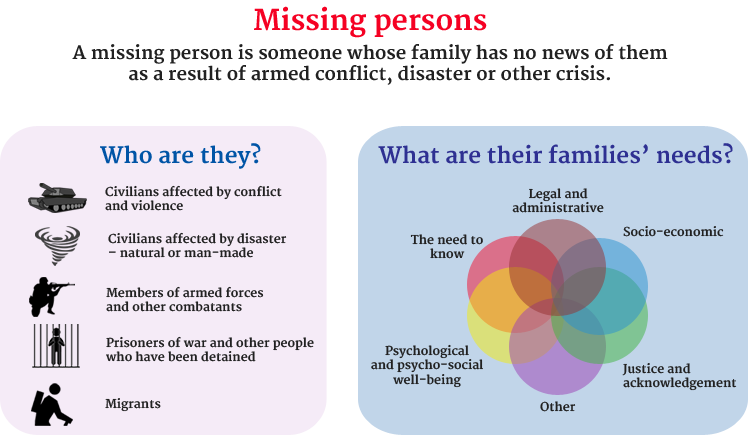An empty chair at the dining table, a pillow not slept in, a faded photograph by the bedside, a cupboard full of dreams not realized. This — and bitter-sweet memories — are all that remain when a loved one goes missing from our lives.
Countless people go missing in armed conflicts and other situations of violence across the world every year. In armed conflicts, civilians are often killed or imprisoned without the knowledge of their families and friends. Many a time, they are imprisoned in poor conditions and denied legal representatives. Some of them are able to return home, while many others are not so lucky. The families of the missing are plunged into an abyss of anguish and uncertainty over the fate of their relatives.
Today, on the International Day of the Disappeared, the ICRC is calling on the international community to show greater awareness of the tragedy of people who have gone missing and the plight of their families. “When people disappear, there are two kinds of victims: the individuals who have gone missing and their families, torn between despair and hope, living with uncertainty and pain, waiting for news, sometimes for decades,” explained Marianne Pecassou, who heads the activities carried out by the ICRC for missing persons and their families.
The plight of people who have disappeared – and the suffering of their families, all too often ignored – has been a constant concern of the ICRC. The organization is currently attempting to establish the fate and whereabouts of more than 52,000 people.
To mark the occasion, the ICRC is unveiling a new publication entitled Living with Absence: Helping the Families of the Missing, which highlights the ordeal of people unaccounted for, underlines the multiple needs of the families and describes the tailored responses the ICRC is providing.
The one-kilometre-long Scarf of Hope, commemorating missing persons in Peru, has for the first time been brought to Europe. Displayed wrapped around the ICRC headquarters building in Geneva, it stands as a vibrant and original symbol of hope for the thousands of people that disappeared in Peru between 1980 and 2000 and whose mothers and fathers, wives and husbands, daughters and sons still do not know what happened to them.
In some places, the numbers of people who have disappeared are staggering. In Colombia, for example, over 68,000 people are still missing, out of more than 90,000 initially reported as such. In Sri Lanka, the fate and whereabouts of more than 16,000 people remain unknown. In Peru, between 13,000 and 16,000 people have vanished and their families are still waiting for news. And around 9,000 people of a total of over 22,000 reported to the ICRC who went missing in connection with the Balkan conflicts are still unaccounted for.
People have the right to know what happened to their missing relatives. International humanitarian law and human rights law require parties to a conflict to take measures to ensure that people do not go missing in an armed conflict. If they do go missing, the parties are required to take all possible measures to ensure their fate is known and their families informed. The families also need an appropriate way to honour the memory of their missing loved ones.
Through the Geneva Conventions, the international community has mandated the ICRC to visit both prisoners of war and civilians interned during armed conflict. The visits aim to ensure that detainees are treated with dignity and humanity, in accordance with international norms and standards. The ICRC also works to prevent disappearances.
The ICRC is empowered to forward family messages and other information between separated members of a family in armed conflicts. Trying to locate people, and putting them back into contact with their relatives, is a major challenge. In India, the Indian Red Cross Society plays a key role in restoring family links.
The ICRC’s Central Tracing Agency and national societies help detainees and civilians caught in conflict or disaster restore contact with their families. The International Tracing Services also help families get information about the fate of missing relatives and trace the remains of those who have died away from home.
Besides working directly with the families of missing persons, the ICRC plays an important role in bringing the issue of the missing onto the public agenda. It urges the authorities to take action aimed at responding to the needs of the families and encourages the search for their missing loved ones.
Resources:
News release: Missing persons must not be forgotten
The Scarf of Hope for families of the missing
Papua New Guinea: Families of missing persons must have answers
Interactive map: How the ICRC is helping families find out what has happened to missing relatives
Empty Chairs: Ten Libyan children aged between 7 and 17 helped us make an emotional seven-minute documentary, expressing their pain in their own words
Missing persons: Questions and answers
ICRC New Delhi



